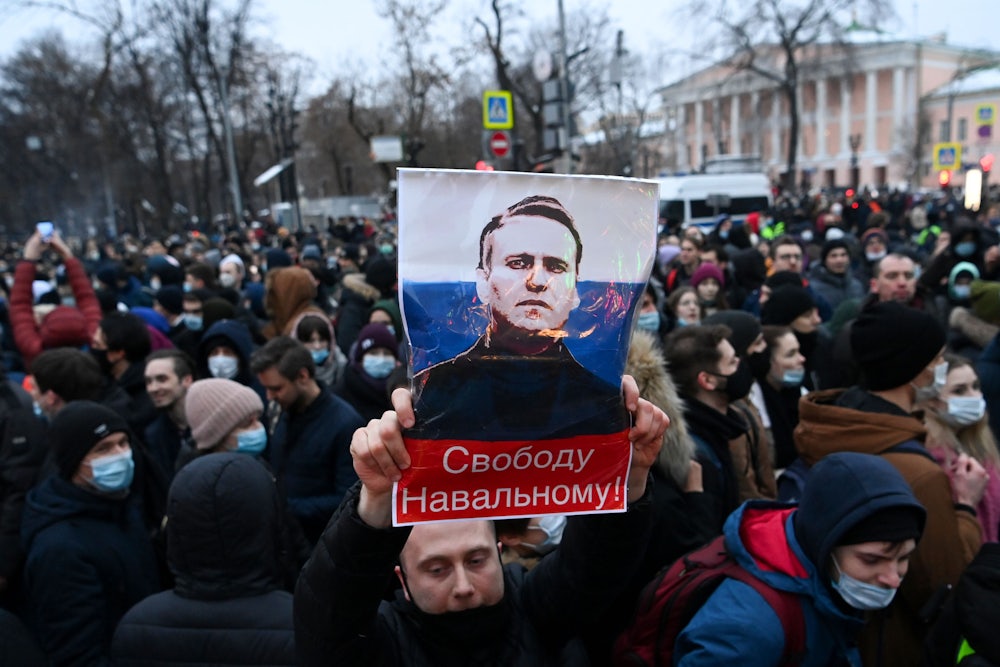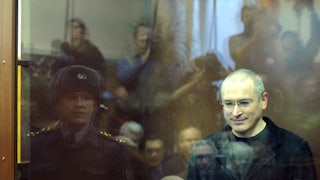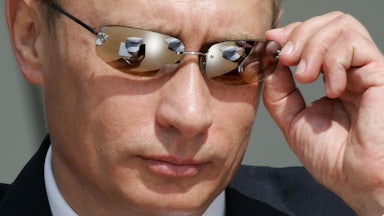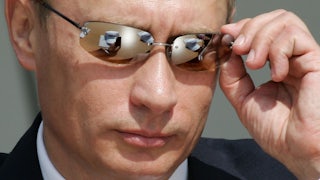Volcanic protests erupted across Russia in the first weekend of Joe Biden’s presidency, adding the challenge of Putinism under duress to the more familiar challenge of dealing with Vladimir Putin’s Russia. As The Washington Post reported, more than 3,000 people were arrested in the demonstrations. Well beyond Moscow and Saint Petersburg, protesters turned out “in a massive show of defiance” to call for opposition leader Alexei Navalny’s release from state custody.
These protests symbolize the beginning of a new era, in which the Biden administration is poised between 2021’s brave new world and the hoped-for restoration of relationships, international configurations, and values that the Trump administration abandoned in its four years of mayhem. This restoration will have to be balanced with the complexities of advancing democracy abroad, a project that Biden should not approach with missionary zeal. Advancing democracy in and around Russia is precisely the terrain on which the United States and Russia have already clashed. It remains the terrain where these two conflict-prone nuclear powers could clash again. Even as protests against Kremlin rule proliferate in Russia, democracy promotion should be handled with caution, and not just because the U.S. no longer represents democracy as radiantly as it did when Joe Biden was vice president.
As Biden no doubt remembers, the first year of President Obama’s first term was one of halcyon self-confidence, although the changeover from George W. Bush occurred amid a financial crisis and devastating wars in Iraq and Afghanistan. The self-confidence flowed from the sense of democratic possibility generated by Barack Obama’s very election. Optimism on the foreign policy front stemmed from the willingness of American voters to elect a nonwhite president and to turn the page, seemingly, on the history of disenfranchising American citizens for reasons of race and ethnicity.
This buoyant mood was reflected in the appointment of a prominent think tanker and academic, Michael McFaul, to the position of senior director for Russia at the National Security Council. The architect of a “reset” with Russia under the more relaxed leadership of Dmitry Medvedev, McFaul believed that Russia’s people surely preferred the blessings of democracy to the confinements of tyranny, and that greater American engagement would encourage Russia’s democratization. Russia’s achievement of democracy would resolve diplomatic tensions between the U.S. and Russia that had flared under Medvedev’s predecessor, Vladimir Putin. In 2012, McFaul was appointed ambassador to the Russian Federation, an endorsement of his thinking and of his expectations.
Nobody would describe the year 2021 in tones of halcyon optimism; the days of Medvedev and Obama now seem like an ancien regime of sorts. Twelve years after McFaul’s arrival at the White House, the Biden administration has named Andrea Kendall-Taylor to the position of NSC senior director for Russia. The contrast is telling. She is the author of Democracies and Authoritarian Regimes and has focused in her government and think-tank career on the global authoritarian influence of Russia and China. Kendall-Taylor’s area of expertise speaks directly to the current fears and anxiety in Washington, fears about the retreat of democracies and the advance of authoritarian regimes—like Russia.
The authoritarian regimes are threatening, but the democracies are not bereft of hope. The Biden administration can itself embody democratic ideals, and it should. With its diplomacy, it can set a good example with multilateralism and with respect for rule of law. It can convene fellow democracies to deal with set-piece issues such as corruption and kleptocracy, which are transnational in nature and do so much to degrade the health of democracies. At the same time, any club of democracies will face a growing list of authoritarian regimes. As did the Obama and Trump administrations before it, the Biden administration will have to contend with a world that is not Americanizing. This calls not just for assertiveness vis-à-vis Russia and China. It calls for considered diplomacy, an acceptance of these governments for what they are (while they are what they are), and a certain amount of give and take with them—in order to avoid war.
Russian authoritarianism is an objective reality. Putin has created yet another system of personal rule in Russia, following in the wake of the tsars and the Soviets. Under his rule, Russians have the freedom to travel, and access to information is freer in Russia than it is in China. Degrees of political opposition to the Kremlin can and do exist: The jailed Navalny has been a formidable crusader against government corruption and harbinger of another possible Russia. Yet Putin need not worry about elections per se or about any legal barriers to his will to power. He has the immense resources of the Russian government, army, media apparatus, and intelligence services at his disposal. With them, he can coerce those he cannot persuade, in hopes that they will follow him or at the very least respond to his rule with indifference. He is constrained only by his own capacity for overreach.
The genuine popularity of Putin’s system is extremely hard to gauge. At age 68, Putin occupies a middle position in Russia—that of a self-proclaimed modernizer who has struggled to fashion a powerful Russian state, catering to the lifestyle aspirations of the younger generation (in the big cities) and the Soviet proclivities of the older generation. His agenda had better prospects when oil prices were rising, as they were from 2000 to 2008, than it does at the present moment. Putin is well aware of developments in Ukraine and Belarus, where potent uprisings arose in Kyiv (in 2013–2014) and this past summer in Minsk against Putin-friendly leaders and the kind of state-sponsored corruption that weighs down Russia. Neither Putin’s survival nor his violent fall is guaranteed.
Putin’s foreign policy reflects the country he governs. It is not rooted in law or in institutions. If he does not always seek the replication of his regime abroad, Putin tends toward conflict with democracies and toward cooperation with countries like China, Belarus, and Syria that are anti-democratic. In Russia, domestic corruption shades into corruption as a foreign policy tool, which, coupled with propaganda and with cyber interference, can be used to destabilize antagonists and to empower partners. Recent meddling in U.S. and European politics demonstrates the scope of Russia’s ambitions and capabilities. Putin looks out at an anarchic and menacing world in which he is condemned to compete with a stronger China and a stronger U.S. He feels the need to have all foreign policy instruments—fair and foul—at his disposal.
Beyond Putin’s tactics, Russia has abiding interests and a foreign policy that cannot be reduced to the regime’s efforts at self-perpetuation. A cardinal interest is Russian autonomy: the desire to be independent of outside powers, especially of the U.S. Another interest is dictating terms (to whatever extent possible) in areas close to Russia and in particular on Russia’s long Western border, where the chief hindrance for Russia is the U.S. and the NATO alliance. A third interest is the Russian economy and access to markets for Russian energy and arms sales. The government’s skill at satisfying a foreign appetite for oil and gas sets the parameters for Russian prosperity and military might. Since coming to power, Putin has adeptly pursued these three interests, while being a poor steward of the Russian economy and resorting with increasing frequency to political repression.
President Biden has ruled out another reset with Russia. He will not build on President Trump’s bizarre and incoherent Russia policy, which mixed rhetorical appeasement with episodic confrontation, without any diplomatic engagement to speak of. No stranger to U.S.-Russia policy and intimately familiar with Putin’s actions on the world stage, Biden knows the weakened position in which Trump has placed the U.S. and the fragile nature of democracy in general. China and Russia are unapologetically authoritarian in their quest for influence—in the Middle East, in Russia’s case, as well as in Africa and Latin America. Technological advances continue to help the Kremlin to exploit the vulnerabilities of open societies, as well as to monitor and control dissent at home.
A safe bet, then, is that the Biden administration will approach Russia not from the vantage point of democratic optimism, as the Obama administration once did, but from that of concern about authoritarianism. To foreground authoritarianism in U.S. Russia policy is to ask three separate questions. What threat does Russia pose to the democratic integrity of the U.S.? What impact does Russian authoritarianism have on the international system and on U.S. interests within this system? And what is to be done about authoritarianism inside Russia? Solutions to the “Russia problem” depend on the definitions given to the problem itself.
Equating the “Russia problem” with authoritarianism might inspire a seductive strategy, premised on the original sin of Russian authoritarianism, which is poisoning the international system and damaging U.S. interests wherever Russian foreign policy has clout. Such authoritarianism might be cast as an existential threat to American democracy. It would necessarily follow that in the name of self-defense, the U.S. and its allies should go to the source and do whatever they can to diminish Russian authoritarianism and, ideally, to see it phased out and replaced by some more democratic form of governance. The alluring prospect is that in a liberated Russia the perils of an authoritarian Russian foreign policy would vanish overnight. This was what McFaul was wishing for in 2009.
Were the U.S. to act on this strategy in 2021, it would lend democracy promotion in Ukraine and Belarus a geopolitical aura. U.S. support for reform in these countries—one an embattled but established democracy, the other a tyranny laboring to keep democracy at bay—would be enacted in part for Russia’s sake. Where Ukraine has gone and where Belarus may go is where Russia is more likely to go if Russians can watch their neighbors’ ascent to democratic success. Greater economic and military resources could be given to Ukraine, and more encouragement to the protest movement in Belarus, in hopes of a transformed Russia. Signs of weakness in Putin’s regime—such as this weekend’s widespread protest demonstrations—would register in this scheme as signs of successful U.S. policy.
The second component of a “pro-democracy” strategy would be to link sanctions and support for Russian civil society to the evolution of Russian democracy. To date, U.S. and European sanctions have been punitive. They are the price Russia must pay for its corruption, for its annexation of Crimea, its occupation of Eastern Ukraine, and for its other disruptive actions. Sanctions could be more ambitiously conceived: as a vehicle for weakening Putin per se, for sowing division within the Kremlin, and for turning the Russian population against the authoritarian system into which it has been corralled. Civil society—and figures like Navalny—might benefit from bona fide American backing, including perhaps the sharing of information on the dirty dealing of Putin and his friends. Sufficiently emboldened, Navalny could be the founding father of a new Russia.
As attractive as this approach might be in theory, it must be resisted in practice, for it misreads the three fundamental questions about authoritarianism and Russia.
Russian disinformation, hacking, and cyber interference are big and growing threats. Yet the origins of these threats do not lie in Russian authoritarianism. There are many authoritarian governments that do not antagonize the U.S. in these domains. Russia’s actions stem from the enmity between the U.S. and Russia. This enmity will be enduring, and while imposing costs on Russia for its hacking and election meddling is prudent and necessary, it is insufficient. Domestic resilience here is the best response—the fostering of a political culture that is less maximalist and less divisive than it has been for the past several years. President Biden will have an uphill battle on this point. He should analytically connect his calls for civility and bipartisanship to his Russia policy, an effective defense against Russian efforts to interfere—or anyone else’s. Even if Russia were to be turned into a pro-American democracy, other actors on the international stage will be doing what they can do to foment division and disunity in the U.S.
Likewise, the Biden administration should think twice before defining the international system as an ideological contest between democracy and authoritarianism. Such was the spirit of the early Cold War, and in that stark and binary conflict, the us-versus-them rhetoric of freedom and slavery was too often an excuse for zealotry, smugness, and the excessive militarization of foreign policy—not to mention a cause of the Vietnam War. The Iraq War followed from a similar mindset. In 2021, democracy and its enemies do not divide up into neat categories. (A bitter lesson of the Trump era is that some of the wiliest enemies of American democracy are American citizens.) A number of NATO allies are illiberal, and the U.S. has a long history of doing business with undemocratic countries. This pragmatism, born of necessity, will always be in fashion.
The part of the international system that matters most to Russia is Ukraine and Belarus. For the U.S., Ukraine is a modest success story. The country has stayed afloat since the strife of 2014. Vice President Biden devoted substantial time and energy to Ukraine. As president, he can consolidate the gains in Ukraine, but he will have to balance an American interest in having a democratic Ukraine with an American interest in regional stability. Should Washington envision Ukraine as a lever to democratize Russia, Putin will destabilize Ukraine further. Similarly, in Belarus the Biden administration should speak out against tyranny. It can honor democratic principle, but it cannot do so in a way that implies the geopolitical separation of Belarus from Putin’s Russia. To this, Russia would respond with military force in a dangerous nether zone between Russian territory and various NATO member states.
As for the third question—what is to be done about authoritarianism within Russia?—the proper answer for the U.S. government is nothing. Washington should not consider itself the prime mover in ending the Putin regime. Putting aside the effect of regime-change policies on Putin’s decision-making, there is little evidence to suggest that Russians themselves are waiting for an American helping hand after almost a decade of American economic sanctions and given the turbulence of American-style democracy. In Ukraine, American assistance was welcomed not just by aspiring democrats but by political forces that wanted to move Ukraine away from Russia for reasons of nationalism or of personal opportunism. By contrast, there is no “other” from which the U.S. can save Russia. The historic “other” for Russia is, in fact, the U.S.
In American foreign policy, regime change deserves a public burial. Again and again, it has led to disaster in the Middle East. It’s tempting to believe the case for regime change that was made in retrospect about 1980s Europe: The U.S. applied pressure, funded dissidents, and lo and behold, the whole Soviet construct fell apart by the end of the decade. This case is remarkably solipsistic. The Soviet Union collapsed because of its own economic inefficiency and because it was a vast, ungovernable empire whose subject populations (including Russians) wanted countries of their own. While the Soviet Union was collapsing, a vociferously anti-Communist president was actually enmeshed in meticulous diplomacy with his Soviet counterpart. In the late 1980s, Ronald Reagan and George H.W. Bush were not dancing on the Soviet Union’s grave. Their diplomatic finesse, not an American push for regime change, enabled the peaceful transition from a Soviet to a post-Soviet era.
Therein lies a lesson for the Biden administration. More and more geriatric, less and less responsive to those it rules, the Putin regime could certainly collapse in the next four years. If it does, everyone will benefit from an already interconnected U.S. and Russian diplomacy—the more contact, the more talk, the more familiarity. The U.S.-Russian relationship needs ballast one way or another, the ballast of meetings and conversations. Under Putin, such ballast could assist with crisis management and the prevention of worst-case scenarios. After Putin, a ballast of working relationships might help create a common path forward.
Each new presidential administration is an opportunity. President Biden should not seek a transformed world or a transformed Russia. Nor should he reject a reset in the name of the status quo. He should take the incremental steps needed to shore up American democracy, to protect the U.S. and its allies from outside meddling, and to normalize sustained and regular diplomatic engagement between the U.S. and the Russian Federation, while affirming free elections and related rights as the aspirational melody of American foreign policy.








